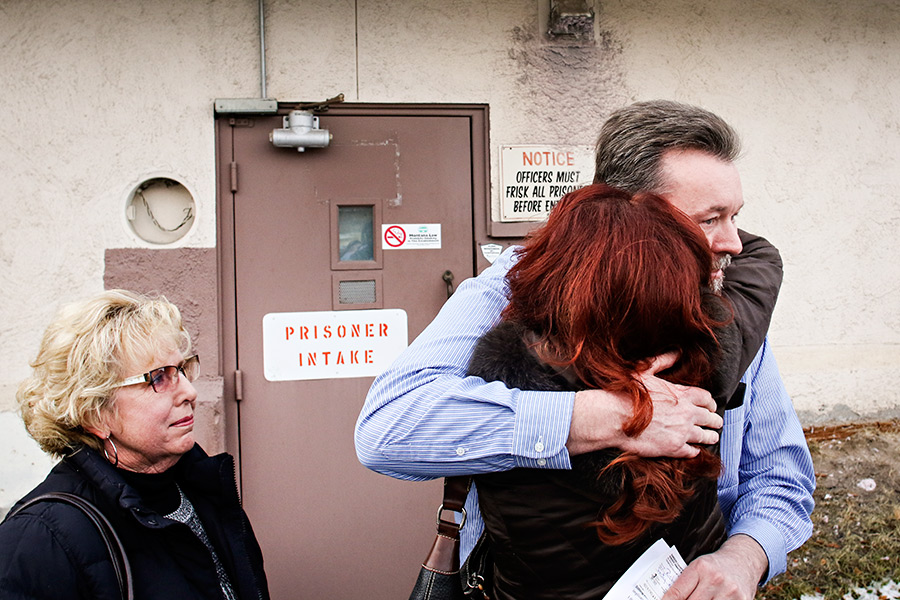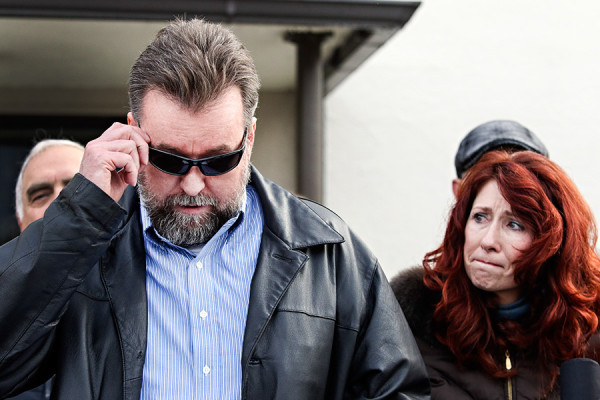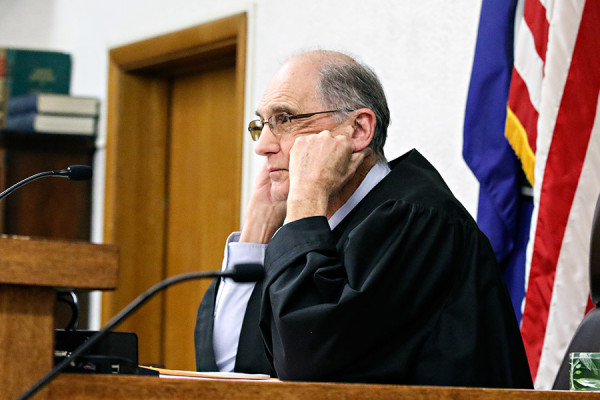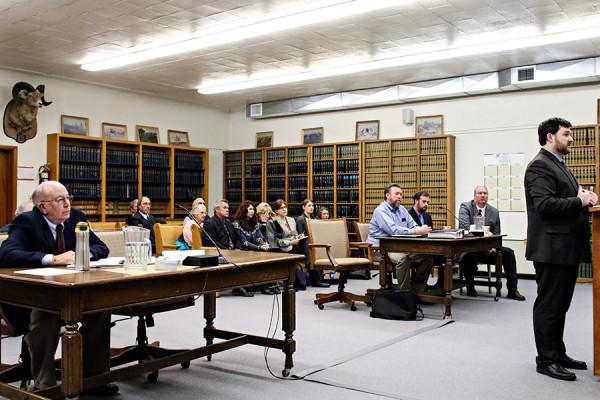Journey to Freedom
Richard Raugust served more than 18 years in prison for the murder of his best friend, a cold-blooded crime he insists he didn’t commit. With his conviction overturned and his release from custody, he hopes to finally clear his name.
By Tristan Scott
THOMPSON FALLS – An hour after a judge freed him from prison, Richard Raugust stepped out of the Sanders County Courthouse and into the open arms of his mother and sister, his first embrace as a civilian in more than 18 years.
Then he clasped his arms around a new fly rod.
Save for a cardboard box of belongings and a plastic documents bin, the new fishing rod is a prized addition to Raugust’s few possessions, his stock in life pared down to the scantest of sums during the nearly two decades he spent incarcerated for the murder of his best friend, a crime he insists he did not commit.
Raugust says the wellspring of hope he maintained through the years of imprisonment, and his resolve to prove his innocence, made up for any want of earthly belongings, filling a void that would have surely broken him had it been left empty.
On Dec. 4, a judge released Raugust on his own recognizance pending a new trial, and he took another giant step in his years-long journey to clear his name.
“I knew this day would come. I just didn’t know when,” said his sister, Mary Webster, having traveled from her home in Oxnard, California, to greet her brother. “I’m so excited for him to start anew. I know he’s ready.”
“I just didn’t think it would take 18 years,” Raugust added.
Raugust, whose 1998 conviction for the murder of Joseph Tash was overturned on Nov. 16 by a district court judge, was released from prison following a bail hearing Dec. 4, and will live in an apartment in Missoula awaiting his day in court and the state’s appeal to the Montana Supreme Court.
Flanked by his legal team and members of the Montana Innocence Project that is representing him – Raugust’s is the first case to result in an overturned verdict since the nonprofit was formed in 2008 – he was choked with emotion as he described the chance for exoneration and the intense grief of being imprisoned for killing his longtime friend, who invited Raugust to Montana in 1997 to work and fish.

Raugust says that idyllic world came crashing down around him when he was wrongfully convicted of Tash’s murder.
“I was hypothetically doomed to make the best of a bad situation, perhaps for the rest of my life,” Raugust, 49, said outside the courthouse. “I will finally get to clear my name and look forward to getting closure for my best friend Joe. Our families, friends and I can then try to salvage what’s left of my life.”
After a few tearful and triumphant hugs, Raugust drove off toward Missoula with his family, tracking along the Clark Fork River with his fishing rod in hand and a pizza lunch on his mind, savoring the first precious moments of freedom.
The latest turn in Raugust’s case came last month, when District Court Judge James B. Wheelis concluded that Raugust’s rights were violated at his 1998 murder trial under a legal rule that requires disclosure of evidence favorable to a defendant – in Raugust’s case, testimony from a sheriff’s deputy that would have bolstered his alibi, which has never faltered.

In granting Raugust’s request for a new trial, the judge wrote that the new evidence, which Raugust’s legal team has exhaustively mounted, “put the entire case against [Raugust] in such a different light as to undermine confidence in the verdict at the underlying trial.”
The guilty verdict was handed down in March 1998 by a Sanders County jury, which sat deadlocked for 10 hours before reaching a unanimous decision late at night.
But with Raugust’s conviction overturned, he is once again presumed innocent of the crime, and the burden of proof is returned to the state.
“Richard Raugust spent 6,708 days, which amounts to 18 years, 4 months, and 11 days, behind bars for a murder we believe he did not commit,” his pro bono attorney, Brett Schandelson, said. “For these many years, justice was not served for Richard or for the family of Joe Tash, Richard’s longtime friend who was murdered. We take a huge step towards remedying that injustice today.”
From the moment of his arrest, Raugust has insisted that he did not murder Tash at a remote campsite the two men shared near Trout Creek, and his story has never wavered.
He has maintained that on July 23, 1997, he, Tash and a man named Rory Ross were drinking at the Naughty Pine Saloon in Trout Creek when, just after closing time, the trio climbed into Ross’ 1985 AMC Eagle, planning to move the party to the camper-trailer Tash and Raugust shared in the nearby Swamp Creek area.

After idling outside Miller’s Market, across the highway from the Naughty Pine, Ross pulled out onto Highway 200 and headed for the campsite. But Raugust said he had second thoughts about the late-night party; knowing he had an early-morning painting job, he hopped out of Ross’ car 200 yards from the bar, near the intersection of Fir Street, and walked to an acquaintance’s house to crash.
He says he was sleeping at the time of the murder, and didn’t hear the report of a single-barrel shotgun blast, which killed Tash and set into motion a chain of events that form the substance of his 18-year resolve to prove his innocence.
Raugust says he didn’t learn of his best friend’s murder until the following day, when police arrived at the job site to arrest him. The arresting officer said Raugust’s reaction was disbelief and bewilderment.
At trial, Ross testified that he never stopped to let Raugust out of the car, and that back at the camper-trailer he watched Raugust shoot Tash in cold blood.
But the defense team contends that the newly discovered testimony of a Sanders County sheriff’s deputy, Wayne Abbey, would have supported Raugust’s alibi at trial, but it was never divulged to Raugust’s lawyer, John Putikka.
The deputy, who performed a bar check at the Naughty Pine the morning of the murder and encountered Raugust, Tash and Ross, testified at trial that he was visiting with the owner and saw Ross’ AMC Eagle parked across the street.
In later interviews with investigators and attorneys from the Innocence Project, Abbey said he glanced out the window a second time and saw Ross’ car stop briefly about 200 yards down the highway. He watched as the brake lights came on and the dome light illuminated before Ross again sped off.
The prosecution never asked Abbey about his observation while he was on the stand in 1998, and the defense didn’t know about it. Without any knowledge of Raugust’s alibi, it never occurred to Abbey that the detail might be important.
Attorneys for Raugust say it’s a key piece of evidence supporting Raugust’s alibi, and that the only testimony undermining it at trial was that of Ross, the man they say is the true killer, and Rick Scarborough, at whose home Raugust says he slept.
In 2009, a legal team assembled by the Montana Innocence Project took notice of Raugust’s claims and began fighting for his innocence. Convinced he was wrongfully convicted, the defense team argues that if jurors heard the new evidence they would not reasonably believe he could have committed the crime, that the facts support his alibi, and that Ross and Scarborough, the state’s key witnesses, colluded to frame Raugust for Tash’s murder.
Raugust’s family and lawyers say the strength of his resolve and his determination to prove his innocence has endured the ultimate test in prison, and he wants only to have his day in court.

“He has not let 18 years of incarceration break him. He has not let it change him. He is the same person,” Schandelson said. “He wants his day in court. He does not want to walk away from this. He is going to see this through.”
“The whole process has been so surreal, knowing he is innocent this entire time,” said Webster, who has supported her brother every step of the way. “He’s never shown any bitterness. He’s never shown any anger or expressed any negativity and his only desire has been to have the truth be told. It is amazing to me that throughout this ordeal he has never been hardened, he has never been broken. He has remained hopeful.”
At the bail hearing, Judge Wheelis denied Sanders County Attorney Robert Zimmerman’s request to impose a bail of $75,000, which Zimmerman called appropriate given that “the charged offense of homicide is one of the most heinous offenses listed in the criminal code.”
“This offense included deadly force, deadly violence,” Zimmerman said. “I don’t think releasing the defendant into the community of Missoula is going to protect the safety of the community.”
Zimmerman said one witness who testified for the state at trial contacted the prosecutor and asked the state to provide protection in the event of Raugust’s release.
But Schandelson countered that it was Raugust who deserved protection, and that his client is presumed innocent of the charges.
“One could speculate that it is one of the two witnesses who perjured themselves at trial,” who contacted Zimmerman, Schandelson said. “We believe that it is Mr. Raugust who is in danger.”
Schandelson said the amount of work that went into overturning Raugust’s conviction is staggering, and said several thousand hours of time has been invested into investigating and litigating the matter over the last five years, nearly all of the time donated by volunteers.
He extended an especially heart warm thanks to the lead investigator in the case, Spencer Veysey, who uncovered Abbey’s testimony. Veysey was killed in a climbing accident in Rocky Mountain National Park this summer.
“There are many people whose efforts led us to today. One such person, whose efforts have been monumentally important not just to Richard’s case, but all the cases at the Montana Innocence Project, is Spencer Veysey,” Schandelson said. “As both an intern and investigator for the project, Spencer uncovered the vital new evidence in Richard’s case that led directly to this result. Sadly, Spencer is no longer with us, but he always believed we’d be standing here with Richard one day.”
Marci Jones, Raugust’s mother, said the family had exhausted its resources when the Montana Innocence Project agreed to take on her son’s case.
“It’s been a long time coming and we were running out of resources,” she said. “It was a godsend.”
Mary Webster said the family had a long shopping list to help her brother acclimate to life outside of the Montana State Prison, including the purchase of a cell phone and computer – Raugust has never used a cell phone or accessed the Internet.
“I can’t wait to see what he does. There are so many avenues that he could travel,” she said. “I’m eager to see what direction that he goes.”
Raugust, who has written prolifically during his imprisonment, said he’s eager to start making strides toward publishing his work, particularly a 230-page collection of poems he calls “Fishers of Trout and Men: Protectors of the Realm,” he hopes to share with fellow vets.
“I think it will help ease their minds,” said Raugust, a U.S. Army veteran. “Particularly veterans with combat-related issues.”
“Please take a close look at everyone surrounding me here today. These are Montana’s hidden gems. It’s a fact that innocent citizens can be wrongfully convicted and these pillars may be your only hope.”
Raugust, who will live in Missoula under some court-imposed conditions, said he’s looking forward to taking advantage of the region’s fishing opportunities.
“I wouldn’t minding throwing a lure in a lake, if there’s water open,” he said.